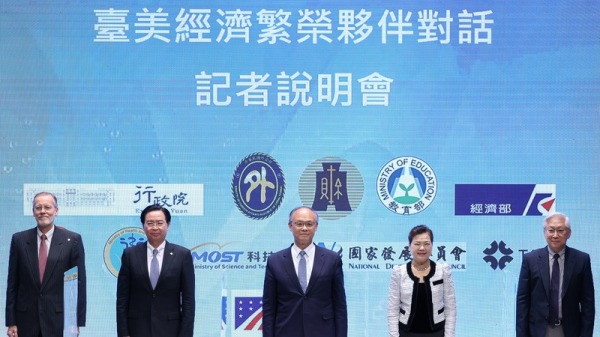On Friday, Nov. 20, Taiwan officials participated in the island state’s first Economic Prosperity Partnership (EPP) Dialogue with the United States in Washington, D.C.
Recent months have seen continuous relationship-building interactions between the U.S. and Taiwan, which is officially known as the Republic of China (ROC). This includes visits by two senior U.S. officials this August and September, signaling a departure from previous administrations’ standoffish approach.
In early September, Google announced plans to set up another data center in Taiwan, according to Taiwan News. In October, Microsoft announced plans to establish its first cloud data center region on the island.
On Nov. 18, city officials in Phoenix approved a development agreement with the Taiwan Semiconductors Manufacturing Corporation (TSMC), where the city would provide $205 million for building up the infrastructure of a planned local TSMC factory equipped to produce 5 nm processing chips, according to Reuters.
TSMC is one of the world’s largest and most competitive contract chipmakers, and collaborates with multiple international tech giants.
Growing dialogue
Success
You are now signed up for our newsletter
Success
Check your email to complete sign up
Taiwan’s Deputy Minister of Economic Affairs Chen Chern-chyi led a delegation to the United States for the dialogue on Friday. Under Secretary of State for Economic Growth, Energy, and the Environment Keith Krach and Assistant Secretary of State for East Asian and Pacific Affairs David Stilwell participated in the talks.
The EPP talks come as part of the Trump administration’s moves to further engagement with the democratic island and strengthen U.S.-Taiwan relations. The Dialogue was hosted by the American Institute in Taiwan (AIT) and the Taipei Economic and Cultural Representative Office (TECRO) in the U.S., which are both de-facto embassies, as the two countries do not have formal diplomatic ties per the Taiwan Relations Act (TRA).
Through the inaugural event, Washington and Taipei agreed to cooperate in multiple areas, including giving top priority to the semiconductor industry, according to the AIT. Agreements on cooperation were also reached in the subjects of 5G security, healthcare, investment screening, and women’s economic empowerment. Afterward, a 5-year memorandum of understanding was signed to finalize the agreements.

The U.S. Department of State praised the Dialogue, expressing hope that “future EPP Dialogues will help strengthen the U.S.-Taiwan economic relationship, further magnify the two societies’ respect for democracy, and strengthen our shared commitment to free markets, entrepreneurship, and freedom.”
On Nov. 21, U.S. Secretary of State Mike Pompeo tweeted: “The United States and Taiwan are strong partners in defending freedom, advancing economic ties, and promoting our shared democratic values.” He also commended the AIT’s role in its deepening cooperation with the ROC.
A ‘robust partnership’
Taiwan President Tsai Ing-wen retweeted Pompeo’s message, adding: “We look forward to continuing our robust partnership with the US in the interests of peace, democracy, & freedom across the region.”
The ROC, which governed all of China, is now officially recognized by only a handful of countries following the 1971 decision by the UN to turn its seat to the People’s Republic of China (PRC), founded in 1949 after communist rebels drove the republican government to Taiwan. While the Chinese Communist Party (CCP) claims the island as an integral part of the PRC, Taiwan has never been under Beijing’s rule.
Despite not officially recognizing or denying the CCP’s claims to Taiwan, the United States is obligated by law to provide Taipei with military assistance, and come to its aid if necessary.
Under the Trump administration, Washington has taken further steps to rekindle its alliance with the democratic island, while dialing up pressure on the CCP and its authoritarian system. Earlier this month, Pompeo confirmed that: “Taiwan has never been a part of China,” referring to the states by their informal names.
The U.S. has recently sold Taiwan three arms packages, the latest being a $600-million package of advanced drones.
On Oct. 20, U.S. senators Marco Rubio (R-Fla.) and Jeff Merkely (D-Ore.) introduced a bipartisan bill, the Taiwan Relations Reinforcement Act, that would secure additional protections for Taiwan’s democracy and freedom through forging stronger economic and diplomatic ties.
“Taiwan’s democracy is critical to peace and stability in the Indo-Pacific region, and our relationship with Taiwan is important to America,” said Merkley, who serves on the Senate Foreign Relations Committee.
“From expanding exchange programs to encouraging Taiwan’s meaningful participation in international organizations to defending U.S. businesses from Chinese coercion, the Taiwan Relations Reinforcement Act takes important steps to promote a robust relationship with Taiwan,” he said.
Liu Pei-chen, a researcher at Taipei-based think tank Taiwan Institute of Economic Research, said that the [United States and Taiwan] are set to harness each other’s strength, with the United States being a leader in chip design while Taiwan’s strength lies in manufacturing, packaging, and testing chips.
In an interview with Bloomberg, a spokesperson for the ROC presidential office said that if Taiwan is able to reduce its economic dependence on the mainland, the CCP will not be able to “extort us politically, and by building closer economic ties with other countries, we will be able to maintain regional peace through shared prosperity.”
By Peter Yan
Follow us on Twitter or subscribe to our email list
















